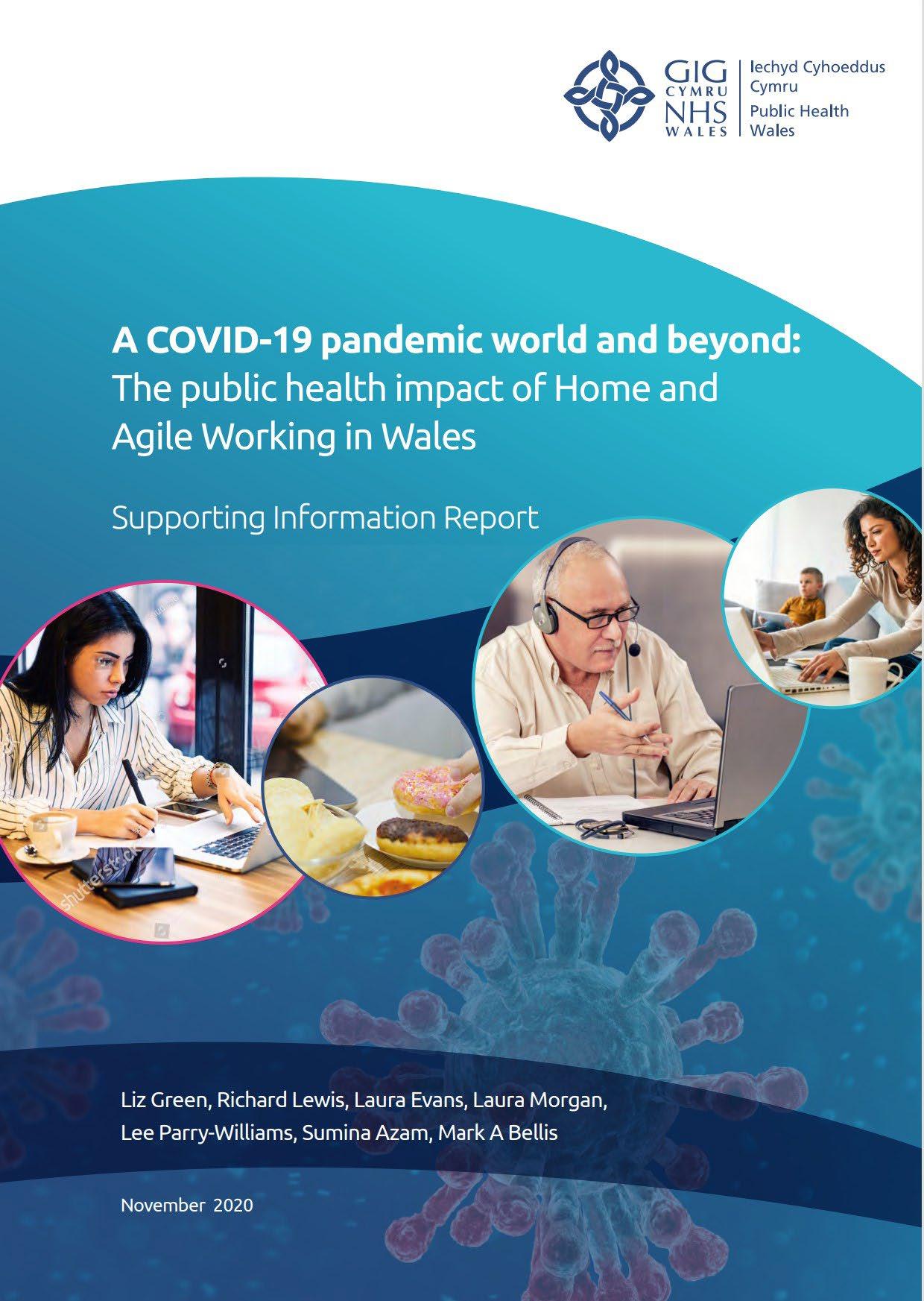
3 minute read
Headlines
Working From Home Guide and An Ideal Future Model for NHS Wales
By Gemma Johns, Sara Khalil, Sashin Ahuja, Mike Ogonovsky & Prof. Alka Ahuja Technology Enabled Care (TEC) Cymru Centre, NHS Wales
Pre-COVID, the concept of NHS working from home (WFH) in many specialities was frowned upon. It's commonly expressed that "we weren't trusted before to WFH…” (Speech & Language Therapist). But, since the pandemic, this change in attitude within NHS Wales and management has meant more staff can now WFH and still continue to offer the same level of care to their patients. As a Paediatric Consultant states: "Some people like going into work and like the face-to-face, but to me there’s benefits for both, it's a benefit doing it from home and it benefits the patient".
WFH clearly provides many benefits to the NHS service, staff and patients, including cost and time savings on travel, parking and the environment [3]; improved flexibility and work-life balance; reduced stress and anxiety; and easier work/school/childcare arrangements [4]. In addition, WFH can be an incentive to increase recruitment and retention in Wales, and potentially attract the retired workforce to return to employment. As a Consultant Psychiatrist states: “Recruitment and retention have been ongoing challenges for the NHS and initiatives like homeworking can make jobs attractive and support worklife balance, then chances are we will have a happier workforce".
These changes in work patterns can however contribute to personal expenses. However, during COVID-19, there were tax relief incentives available to help cover WFH expenses, such as heating, metered water bills, home contents insurance, business calls or broadband connections [5].
There are other challenges associated to WFH such as the inability to link patient notes to WFH devices e.g., using electronic records. There are also concerns on the mental health and wellbeing impacts of WFH such as the risk of social isolation and loneliness and physical impacts related to WFH [4], in that a spinal surgeon argues that "We are seeing much higher rates of younger patient referrals for back pain… this is related to inadequate homeworking set-ups".
To better understand the benefits and challenges of WFH during the pandemic and to provide future recommendations based on the voices of the NHS professionals themselves, TEC Cymru have been running 21 virtual design workshops with NHS Wales staff throughout March 2021 to design an 'Ideal WFH Future NHS Wales Model'. There is also a survey still running, so please share your experiences and views here: surveymonkey.co.uk/r/MCHGF7F
In addition, TEC Cymru have developed a WFH Guide in partnership with Psychiatry & Spinal Surgery services in Wales with useful hints and tips. Home Working Guide: Protecting Mental & Physical Health
• Technology Enabled Care Cymru
Cited at digitalhealth.wales/tec-cymru • Welsh Government: aim for 30% of
Welsh Workforce to Work Remotely.
Cited at gov.wales/aim-30-welshworkforce-work-remotely • Johns, G., Khalil, S., Ogonovsky, M.,
Ahuja, A. Video Consulting Contributes to Carbon Neutral Healthcare. BMJ 2020; 371 doi: doi.org/10.1136/bmj.m4300 (Published 06 November 2020) • Technology Enabled Care Cymru 2021
Data digitalhealth.wales/tec-cymru/howwe-can-help/evidence • Government UK Claim Tax Relief for your job expenses. Cited at gov.uk/tax-relieffor-employees/working-at-home *NHS Staff Quotes captured in interviews by the TEC Cymru Research, Innovation & Improvement Team 2021 (data from a larger study).

Disparity Begins at Home: How home working is impacting the public’s health
The Royal Society for Public Health (RSPH) has released a report looking at how working from home has affected the public’s health and wellbeing. The report includes a snapshot survey of the public who had been working from home for the first time. Just under half of all respondents said that they felt working from home was better for their health and wellbeing, and cited saving money and having a better work/life balance among the benefits, and just 6% of people said they wanted to return to the office fulltime. However, they also found evidence of negative impacts of working from home, including social isolation, less exercise, musculoskeletal problems, and disrupted sleep. Their report identified inequalities in how working from home affects people's health and wellbeing, with those who live in a house-share with at least one housemate more likely to experience musculoskeletal problems, undertake less exercise and feel more isolated than people who live with their partner. Similarly, people aged 35 and over were a lot more likely to think that working from home was better for their health and wellbeing compared to 18-34 year-olds.
You can read the report in full here
A COVID-19 pandemic world and beyond: The public health impact of Home and Agile Working in Wales
Click here to view the full report
View Report






